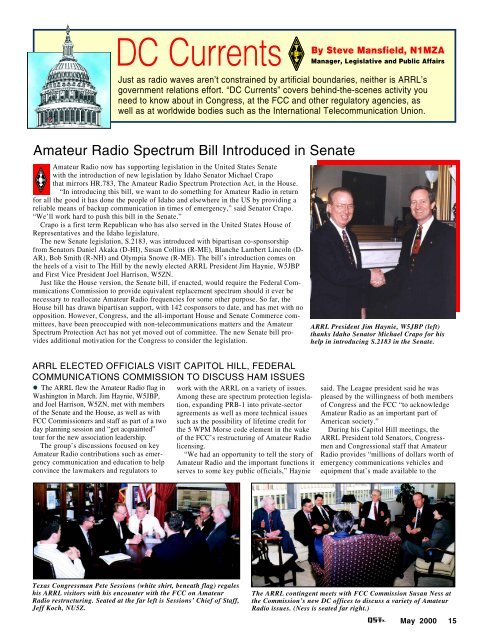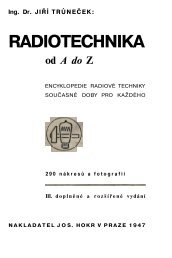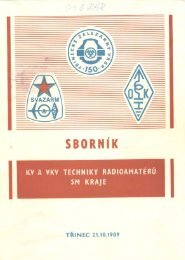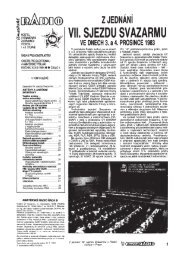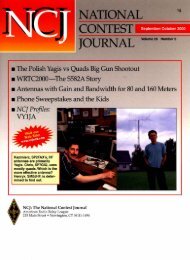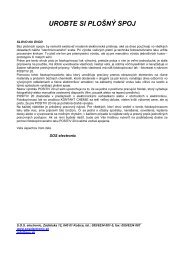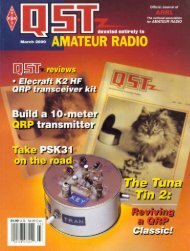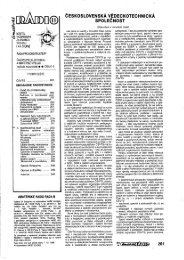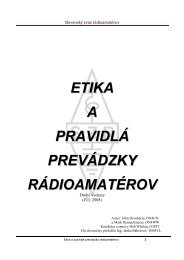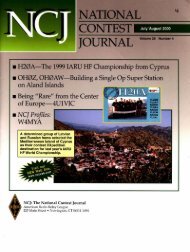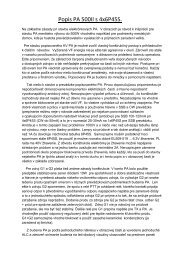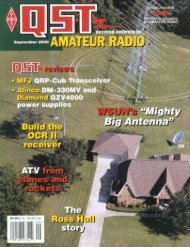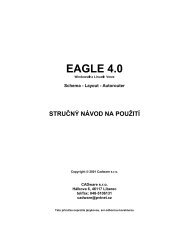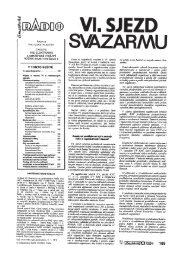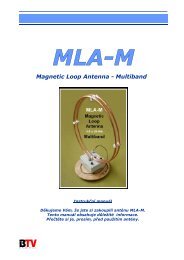You also want an ePaper? Increase the reach of your titles
YUMPU automatically turns print PDFs into web optimized ePapers that Google loves.
DC CurrentsRALRBy Steve Mansfield, N1MZAManager, Legislative and Public AffairsJust as radio waves aren’t constrained by artificial boundaries, neither is ARRL’sgovernment relations effort. “DC Currents” covers behind-the-scenes activity youneed to know about in Congress, at the FCC and other regulatory agencies, aswell as at worldwide bodies such as the International Telecommunication Union.Amateur Radio Spectrum Bill Introduced in SenateAmateur Radio now has supporting legislation in the United States Senatewith the introduction of new legislation by Idaho Senator Michael Crapothat mirrors HR.783, The Amateur Radio Spectrum Protection Act, in the House.“In introducing this bill, we want to do something for Amateur Radio in returnfor all the good it has done the people of Idaho and elsewhere in the US by providing areliable means of backup communication in times of emergency,” said Senator Crapo.“We’ll work hard to push this bill in the Senate.”Crapo is a first term Republican who has also served in the United States House ofRepresentatives and the Idaho legislature.The new Senate legislation, S.2183, was introduced with bipartisan co-sponsorshipfrom Senators Daniel Akaka (D-HI), Susan Collins (R-ME), Blanche Lambert Lincoln (D-AR), Bob Smith (R-NH) and Olympia Snowe (R-ME). The bill’s introduction comes onthe heels of a visit to The Hill by the newly elected ARRL President Jim Haynie, W5JBPand First Vice President Joel Harrison, W5ZN.Just like the House version, the Senate bill, if enacted, would require the Federal CommunicationsCommission to provide equivalent replacement spectrum should it ever benecessary to reallocate Amateur Radio frequencies for some other purpose. So far, theHouse bill has drawn bipartisan support, with 142 cosponsors to date, and has met with noopposition. However, Congress, and the all-important House and Senate Commerce committees,have been preoccupied with non-telecommunications matters and the AmateurSpectrum Protection Act has not yet moved out of committee. The new Senate bill providesadditional motivation for the Congress to consider the legislation.ARRL President Jim Haynie, W5JBP (left)thanks Idaho Senator Michael Crapo for hishelp in introducing S.2183 in the Senate.ARRL ELECTED OFFICIALS VISIT CAPITOL HILL, FEDERALCOMMUNICATIONS COMMISSION TO DISCUSS HAM ISSUES• The ARRL flew the Amateur Radio flag inWashington in March. Jim Haynie, W5JBP,and Joel Harrison, W5ZN, met with membersof the Senate and the House, as well as withFCC Commissioners and staff as part of a twoday planning session and “get acquainted”tour for the new association leadership.The group’s discussions focused on keyAmateur Radio contributions such as emergencycommunication and education to helpconvince the lawmakers and regulators towork with the ARRL on a variety of issues.Among these are spectrum protection legislation,expanding PRB-1 into private-sectoragreements as well as more technical issuessuch as the possibility of lifetime credit forthe 5 WPM Morse code element in the wakeof the FCC’s restructuring of Amateur Radiolicensing.“We had an opportunity to tell the story ofAmateur Radio and the important functions itserves to some key public officials,” Hayniesaid. The League president said he waspleased by the willingness of both membersof Congress and the FCC “to acknowledgeAmateur Radio as an important part ofAmerican society.”During his Capitol Hill meetings, theARRL President told Senators, Congressmenand Congressional staff that AmateurRadio provides “millions of dollars worth ofemergency communications vehicles andequipment that’s made available to theTexas Congressman Pete Sessions (white shirt, beneath flag) regaleshis ARRL visitors with his encounter with the FCC on AmateurRadio restructuring. Seated at the far left is Sessions’ Chief of Staff,Jeff Koch, NU5Z.The ARRL contingent meets with FCC Commission Susan Ness atthe Commission’s new DC offices to discuss a variety of AmateurRadio issues. (Ness is seated far right.)<strong>May</strong> <strong>2000</strong> 15


